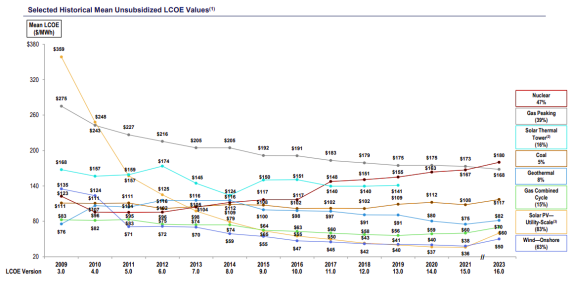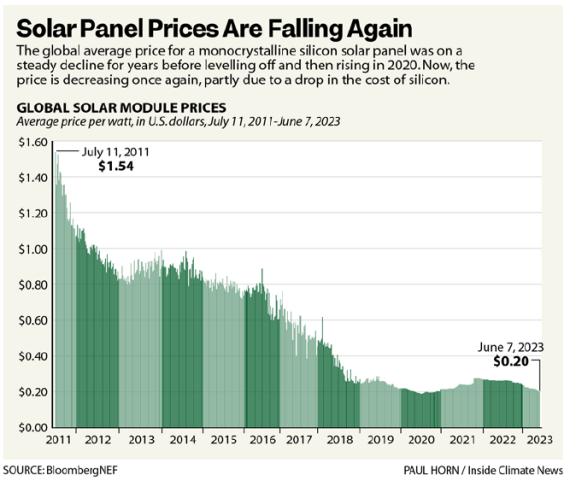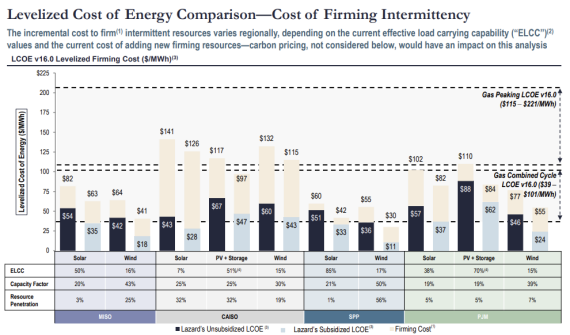Is solar energy more expensive than energy from fossil fuels?
What the science says...
Unsubsidized solar energy is now generally cheaper than fossil fuels and according to the International Energy Agency, solar PV is “the cheapest source of new electricity generation in most parts of the world."
Solar energy is more expensive than fossil fuels and completely dependent on subsidies
"Solar farms depend entirely on subsidies from your hard earned money. When the subsidies are gone, the solar farms are abandoned!" (How solar affects YOU!)
Unsubsidized solar energy is now generally cheaper than fossil fuels. According to the International Energy Agency’s 2020 World Energy Outlook, photovoltaic solar power is “the cheapest source of new electricity generation in most parts of the world,” and “[f]or projects with low cost financing that tap high quality resources, solar PV is now the cheapest source of electricity in history1.”
Solar energy compares favorably to fossil fuels in terms of levelized cost (i.e., lifetime costs divided by lifetime energy output). According to Lazard’s April 2023 Levelized Cost of Energy Analysis, the mean unsubsidized levelized cost of utility-scale solar PV is $60/MWh2. By comparison, the mean unsubsidized levelized cost of gas combined cycle is $70/MWh, the mean unsubsidized levelized cost of coal is $117/MWh, and the mean unsubsidized levelized cost of gas peaking is $168/MWh. The figure below from Lazard shows historical mean unsubsidized LCOE values for different types of utility-scale energy generation.
Figure 1: Selected historical mean unsubsidized LCOE values. This graph reflects the average of the high and low LCOE for each technology in each year. The percentages on the right of the figure represent the decrease in average LCOE since 2009. Source: Lazard (reproduced with permission)2.
Lazard attributes the significant historical cost declines for utility-scale renewable energy generation to decreasing capital costs, improving technologies, and increased competition, among other factors. For solar energy, as with onshore wind energy and electric vehicle batteries, historical decreases in costs have correlated with increases in cumulative capacity and sales3. As one example of decreasing costs of solar generation, the figure below from Inside Climate News shows a roughly 90% decline in solar module prices from 2011 to 20234.
Figure 2: Solar price from 2011 to 2023. Source: BloombergNEF/Paul Horn/Inside Climate News.
In addition to the many factors reducing solar’s unsubsidized LCOE, there are substantial subsidies that will further reduce cost on a subsidized basis. In particular, the Inflation Reduction Act is predicted to reduce the subsidized LCOE for solar by 20%–35% by 20305.
Fossil fuels also receive subsidies, albeit smaller subsidies than renewable energy currently received6. In fiscal year 2022, the federal government’s tax expenditures for natural gas and petroleum subsidies were $2.1 billion.
One shortcoming of relying on levelized cost as a metric for comparing solar with natural gas and other types of legacy power plants is that levelized cost does not take into account that additional energy generation is needed to compensate for any intermittency. But even when factoring in these so-called firming costs, the subsidized and unsubsidized LCOE of stand-alone solar is lower than the levelized cost of gas peaking and cost-competitive with gas combined cycle across most of the United States7. Solar-plus-storage systems are more expensive. However, when factoring in firming costs, both the subsidized and unsubsidized LCOE of solar plus storage is generally within or below the range of LCOE for gas peaking, depending on location within the United States.
Figure 3: LCOE for wind, solar, and solar plus storage, adjusted for the cost of firming intermittency. Source: Lazard (reproduced with permission)2.
Footnotes:
[1] World Energy Outlook 2020, Int’l. Energy Agency, 202, 214 (2020)
[2] Levelized Cost of Energy Analysis: Version 16.0, Lazard, 9 (Apr. 2023)
[3] U.S. Global Change Research Program, Fifth National Climate Assessment at 32-29 (2023)
[4] Dan Gearino, Inexpensive Solar Panels Are Essential for the Energy Transition. Here’s What’s Happening With Prices Right Now, Inside Climate News (Jun. 15, 2023)
[5] Ian Bowen et al., How clean energy economics can benefit from the biggest climate law in US history, ICF (Sept. 16, 2022)
[6] Federal Financial Interventions and Subsidies in Energy in Fiscal Years 2016-2022, U.S. Energy Information Admin., at 3 (Aug. 2023)
[7] Lazard [2] at 8. California is the exception, where the subsidized and unsubsidized LCOE of solar exceeds that of gas combined cycle when factoring in firming costs.
This rebuttal is based on the report "Rebutting 33 False Claims About Solar, Wind, and Electric Vehicles" written by Matthew Eisenson, Jacob Elkin, Andy Fitch, Matthew Ard, Kaya Sittinger & Samuel Lavine and published by the Sabin Center for Climate Change Law at Columbia Law School in 2024. Skeptical Science sincerely appreciates Sabin Center's generosity in collaborating with us to make this information available as widely as possible.
Last updated on 27 October 2024 by Sabin Center Team. View Archives































 Arguments
Arguments
































Climate Myth...